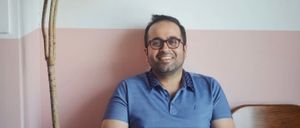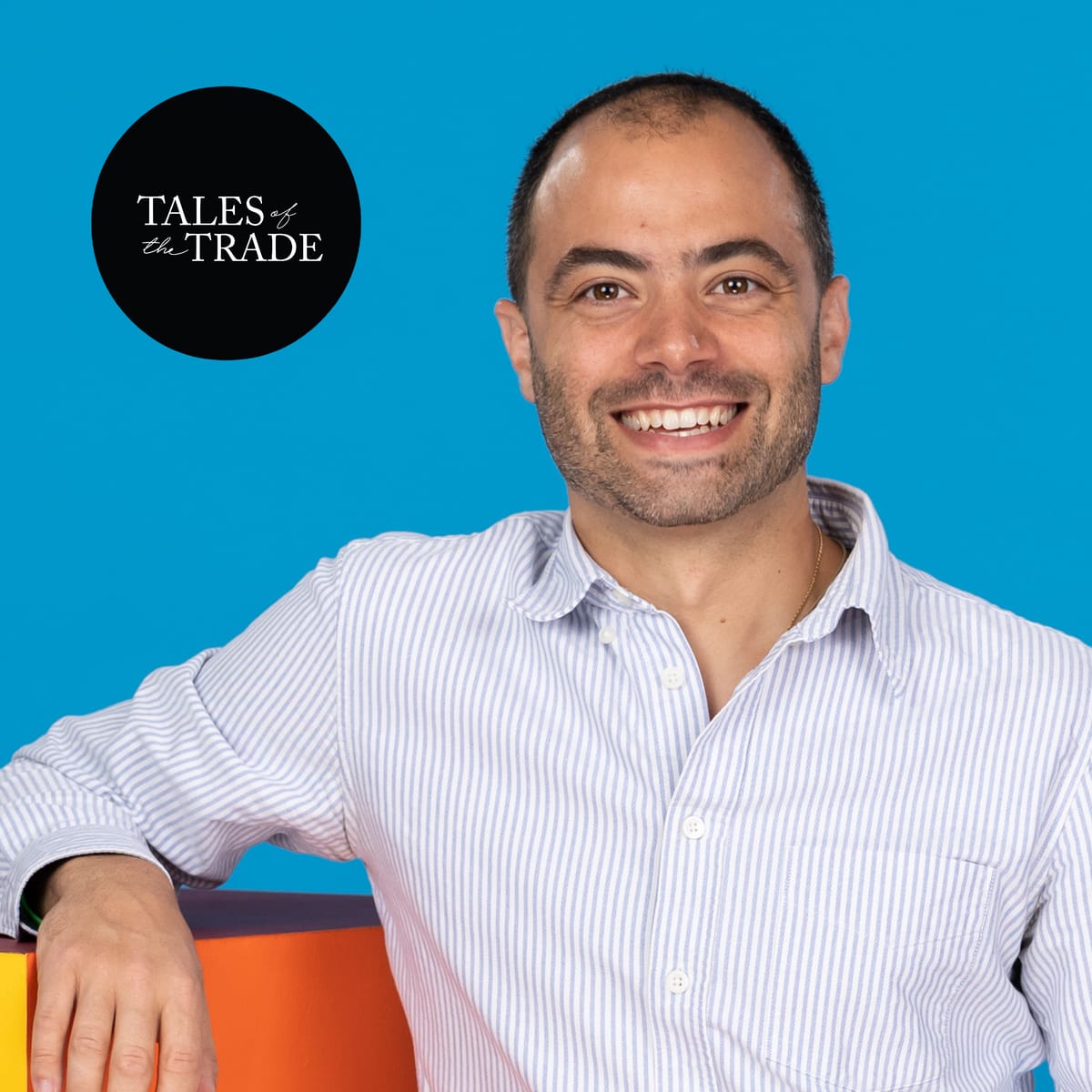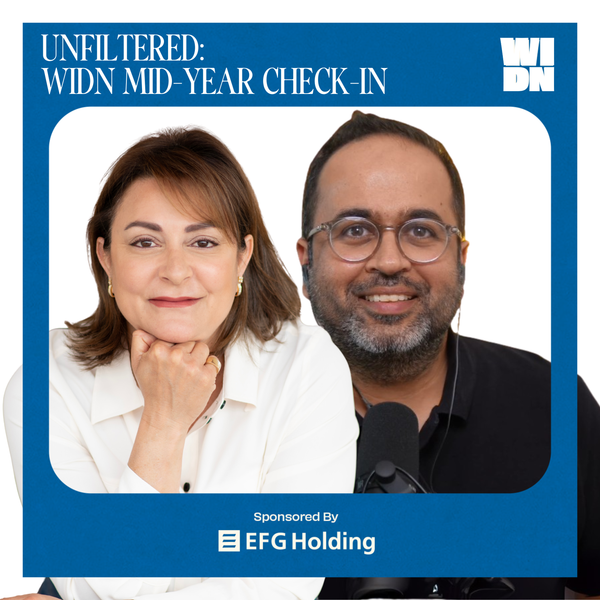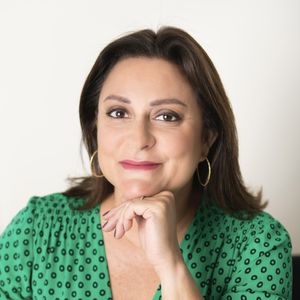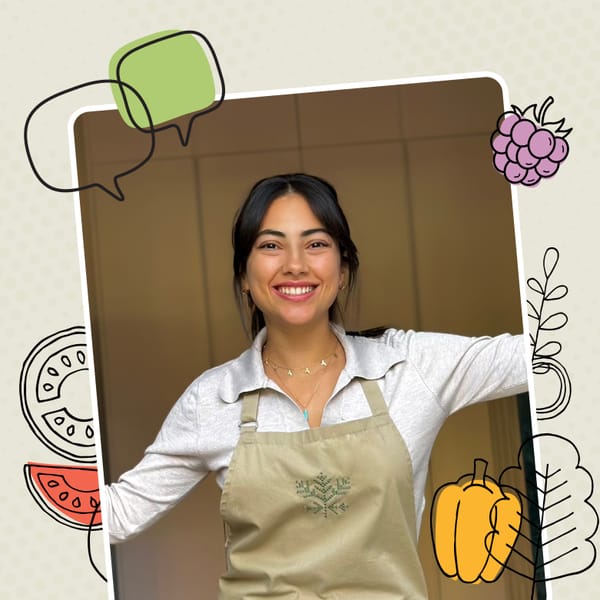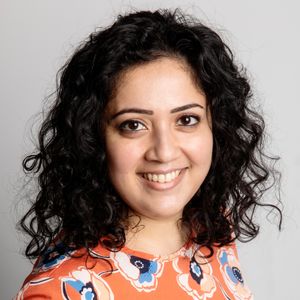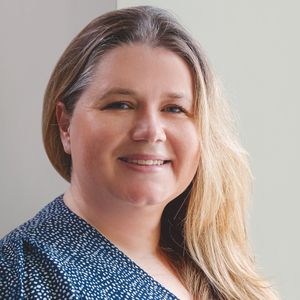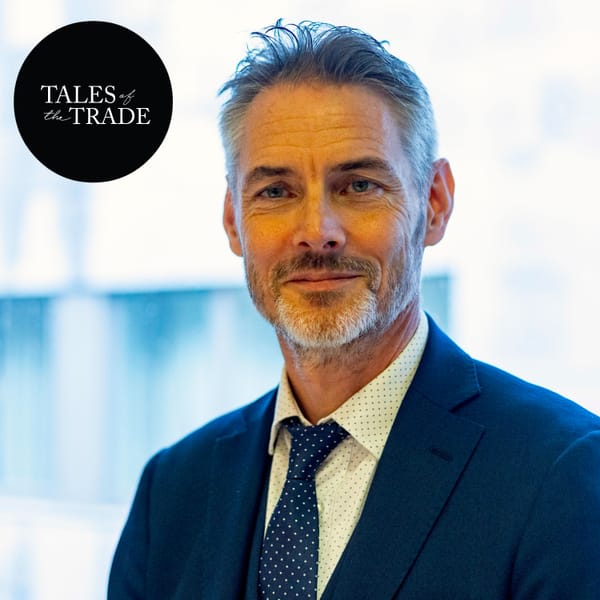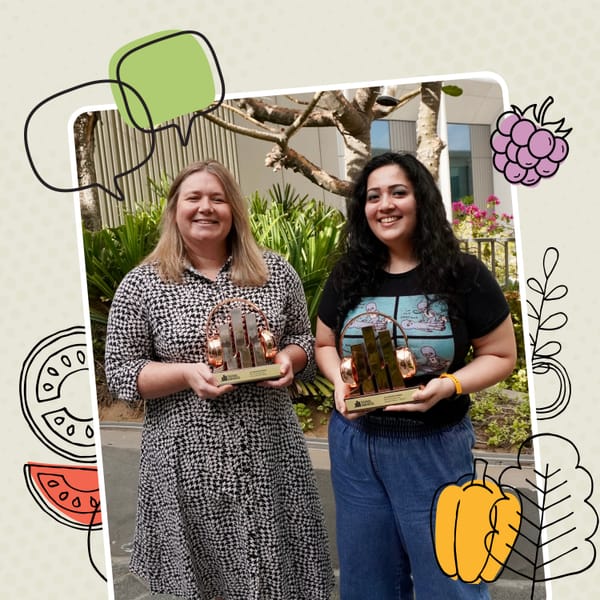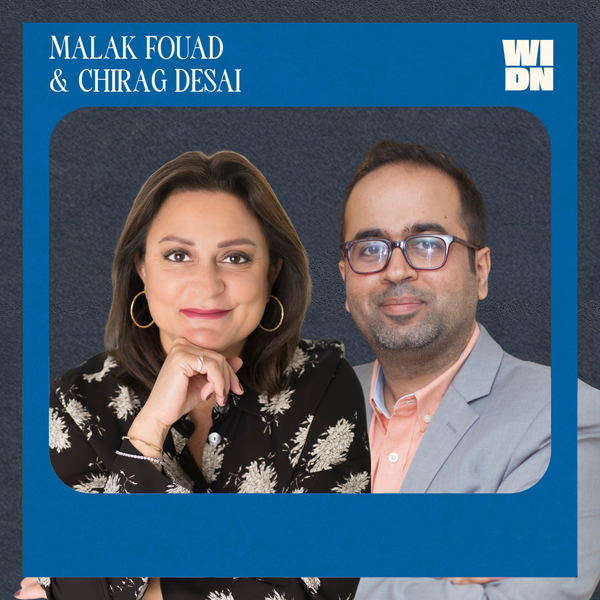Ramsey tells me about his entrepreneurial journey, why he’s an unintentional leader & lessons from their recent podcast acquisitions of Finyal Media in 2022 & Rising Giants Network last year.
On a special bonus episode, Ramsey also shares his thoughts on the MENA podcast landscape. This bonus episode is available to subscribers tomorrow and everyone else next week.
Links
- Our 2021 predictions on Apple Podcast Subscriptions
- Sowt acquires Finyal Media (2022)
- Sowt acquires Rising Giants Network (2023)
Transcript
Chirag Desai
From Amaeya Media, you're listening to Tales of the Trade, conversations with pioneers from our region and the stories behind the communities they are bringing to life. I'm Chirag Desai. And on today's episode, Ramsey Tesdell tells me about his entrepreneurial journey building podcasting powerhouse Sowt, and the importance of working on yourself as a leader.
Ramsey Tesdell
You're probably a Reddit geek like I am, but I spend some time on Reddit and there's these posts that I love, right? It's like a post that's like, hey, 40-year-olds, what is one thing that you would tell your 20-year-old self what you would do? It's all like take care of your back, take care of your teeth. But one of them was start working on yourself earlier in small pieces. Because we go through education. We learn a lot and there's all this development. We're growing really quickly. And then we get into our career and our professions. And there isn't that intentional growth.
And so this is something that I personally wish I had done earlier and done more of earlier. And so, you know, what's the best way to mitigate that or to make up for that is instituted in the culture of the organization.
Chirag Desai
Ramsey Tesdell is the co-founder of Sowt, the independent podcast company based in Jordan. Now, the company itself started out as a social networking platform. And in 2017, Ramsey got together with his two co-founders to lead their pivot into podcast network. Today, Sowt produces more than 50 shows, partners with local and international organizations, and has led the two regional acquisitions in the podcast space. Now, this was our second episode together. Three years ago, Ramsey joined me and another podcaster, Lucas Skrobot — Hey, Lucas — for a live episode on Twitter Spaces to talk about the impact of Apple Podcast subscriptions. I'll leave you a link in our show notes if you want to see how accurate our predictions were.
But let's dig into Ramsey's entrepreneurial journey and his early influences growing up in the U.S.
Ramsey Tesdell
Although I've rejected that label. I've rejected that label many, many times over and over again. I guess I would be considered like a third culture kid. But I think, you know, I did most of my schooling, all my schooling in the U.S. And then in 2006, you know, the stars aligned in some way to come to Jordan and spend a bunch of time here.
Chirag Desai
I heard you say recently that like it was a you came back to kind of explore your identity. Was it just that or was it something else? I mean, I always use the language like I came back to Jordan.
Ramsey Tesdell
But it was like really the first time I'd been here, the first time I arrived on my own by myself without, you know, my mother or like someone telling me what to do and where to go and who to say hi to and what food to eat.
Chirag Desai
Basically as an adult.
Ramsey Tesdell
As an adult, sort of. Physically, maybe an adult, but maybe not maturity as an adult. And then, you know, 18 years, 17 and a half years later, here we are still in Jordan. And this is home, you know, and we have a house and a family. And the kids and all kinds of a sick cat. Poor cat is sick. He's getting hopefully better.
But then the second part of your question, I come from a family of academics, whether like Ph.D. doctors in the university academics or just like teachers, educators, you know, all the way from like teaching English as a second language to like younger school kids. Kids. You know, on both sides, on a lot of a lot of my family actually are mostly educators. You know, my brother, my father, my mother in many ways, my aunts, uncles. So I was steeped in that like kind of culture.
And I think what's interesting about that is education. The flip side of education is curiosity, I think. And so being curious, I think that kind of helped, you know, my brother and I and the people around us to be curious. And I think that's a really important. A really important, you know, trait to have.
Chirag Desai
Let's also trace a little bit about South's journey. Right. So was it it was just an organic sort of foray into saying here's an opportunity and I want to take it. Or was it, you know, I want to break from what I was doing up to now and I want to go do my own thing, which is again, I mean, you know, there's no wrong answer, so to speak, because everybody has a different path to it.
Ramsey Tesdell
But yeah, yours is. I mean, I was definitely as a child was always trying to do the opposite of what my brother was doing or the opposite of what my family was doing. Like, for sure. Like, that was definitely part of it. But I don't think this was like an intentional step away from what other people were doing. And in some ways, actually. Until maybe quite recently, I wouldn't really have considered myself an entrepreneur. I wouldn't really have considered myself, you know, someone who's actually building a business. What changed it for you? Yeah, maybe I just admitted to myself that I was actually, you know, building a business that was, you know, uninteresting.
Intentionally, maybe success, semi successful, you know, it's like, oh, my gosh, this thing is growing and it keeps growing. Maybe we need to get serious about this. So definitely, you know, in a lot of ways, a lot of it was unintentional. And it was interesting, you know, we were I was talking to a marketing person recently, you know, I was like, OK, we need to increase our marketing. We need to grow our audiences by X amount and, you know, all these things. And he was like, well, you have a big audience. I was like, yeah, but it needs to be bigger. And he was like, you know, Salt already has. What I'm saying? It's what a lot of people are trying to get. And what that is, is organic reach. He's like, that's fantastic. And so I was like, OK, but now I want inorganic reach.
So make this thing make this grow, you know, but it's a great place to start from, you know, because we focused on creating content in a way that not a lot of people were. And we focused on creating content from a perspective that, you know, wasn't really out there. And so that's kind of, you know, where we we we filled some gaps or, you know, kind of carved out a little bit of a niche.
Chirag Desai
There now, I know podcasts seem very mainstream these days, but we're actually building on a two decade history. We can trace the origins of the medium to the year 2000, even though the word podcast itself wasn't coined until 2004. Of course, the launch of Serial in 2014 was a big takeoff point, and it's been an absolute whirlwind since 2019 when Spotify set up a number of high ticket acquisitions. In the region, though, the larger podcasting ecosystem was just about beginning to take shape in 2017 when Salt was getting started. In fact, it was around the same time that the first building blocks for Amaeya media were coming together. And by then, Ramsey had already had his first taste of entrepreneurship.
Ramsey Tesdell
It was like a media website, you know, it was like a journalism independent media website, and that's still going. And I'm really happy to see that, like, grow and like flourish beyond me. I had wanted to move into audio for for several different reasons. I like it. I listen to it a lot. Grew up listening to NPR and a lot of the the good radio. I'm in the US. And so I always looked to, you know, model that in some way. And so and really it was just kind of random chance. A friend of mine, you know, had a company that was like the original Twitter, which is like an audio social network.
Right. And so they were sending around audio messages back and forth. This was before the days of voice notes. We're now voice notes are, you know, integral part of our society, whether we like them or not.
Chirag Desai
Very much so. And it was still awkward to hear your voice and send your voice to someone else on a short message and whatnot.
Ramsey Tesdell
So, you know, they didn't have the traction that they wanted. They were growing, they were doing OK, but they didn't it wasn't quite where they wanted. And so when I came along and was like, oh, this could be really interesting to, you know, pivot or to move towards podcasts, they loved the idea. And so basically we came up with a scheme that would, you know, as we hit certain targets and grew in certain ways, you know, I would become a bigger partner. And then we leveled out at a certain place that I'm a partner with with with, you know, three other people, basically. You know, they are fantastic partners in that sense that they're extremely supportive.
They don't get involved in, you know, details that, you know, that too many cooks in the kitchen and whatnot. And we have a fantastic relationship. And I think that's probably one of the reasons, you know, that we've been successful is that, you know, we have a really good working relationship with each other. And. So, so it has, you know, from that, you know, random kind of meeting as friends to discuss this to, you know, now we're we're 30 plus, you know, full time employees.
We have probably 40 or maybe even 50 kind of original podcasts now with the latest acquisition and, you know, as many or more client or kind of branded studio podcasts as well. And so. So, yeah, things have really taken off and, and it's been interesting to see that journey and, you know, being a part of it, you don't always recognize it, right? Yeah. You know, you're a founder, you're a, you're a entrepreneur, you, you're building stuff, you know, we're builders, right? And so sometimes you have to take that moment and stop and like, whoa, did we do all that? That's pretty amazing.
You know.
Chirag Desai
Actually conversations like this is when I can stop and be like, oh yeah. Okay. Yes. Also. Yes. Also. Yes.
Ramsey Tesdell
Right. Is there a.
Chirag Desai
Specific moment, maybe when you looked at it, that you said, okay, yes, now we are here or now we arrive or now this is working because I think that's one of the things, at least I know again, from a building point of view, you don't really notice, right? When you're in the moment, you're just like, okay, next thing, next thing, next thing, next thing.
Ramsey Tesdell
Man, you know, the journey building has been so intense and it started right around, you know, my first, like when we had our first kid, when our first child came. And it was interesting because, you know, I made. A very risky move to, you know, leave a full-time, you know, well-paying job to, you know, take peanuts basically for, for a couple of years to get this thing going. You know, with the idea at some point, hopefully that, you know, it will make that back and, and more. There isn't necessarily like one big moment. And I think you're right.
Like this idea of taking a moment to reflect, you know, when you're speaking to someone like another founder, another builder, or if you're in an. Interview or on a panel, sometimes I have these moments where I'm like reflecting and, and whatnot, but I did have a specific moment where I was like, oh, you know, I have this project and, and they kind of just looked at me and they were like, this is not a project. This is a company with like revenue and like shows and people look to it for, you know, information and whatnot. And so I think that was a moment in, in, in a lot of sense, which was maybe like three years ago during the pandemic, maybe where it was like, okay, no, this is.
Like, this is much more serious than I was kind of, you know, still thinking of it as like a little thing that I was doing one thing that you were doing a project.
Chirag Desai
Yeah.
Ramsey Tesdell
I think in the last, like two or three years, there's been a collection of moments, you know, talking to an investor, talking to, you know, uh, these, like, uh, the media development investment fund, you know, that have financed some of our work, um, over the last couple of years and, and some other things. And, and those, you know, when explaining kind of what we do and where we've achieved. And. Um, and I also think, you know, looking at other people's numbers and seeing other people's numbers and, and looking into other companies and the mergers and acquisitions, I think are kind of an interesting strategy because you get to see a lot of information, right? Yeah, of course.
Um, which is very interesting because, you know, we hold these things very tightly to our, to our, to our companies. And so seeing that and seeing where you are compared to that is, I think is very interesting. And generally what we've seen is that we're bigger. We, we do more. Um, than a lot of the people that we kind of considered our peers. Um, and so that's, that's been kind of interesting to see that kind of strategy, uh, have kind of byproducts like that. Um, and then you can always compare it to things that are bigger and better. Right. And I always tell my team, like, you know, again, we had like an HR issue and we handled it really well and everybody's kind of like, oh, that was great and whatnot.
And, uh, I was like, yeah, that's really great. If you compare ourselves to, you know, us or below us. But compare yourself to something above bigger, better, it doesn't have to necessarily be bigger, but more professional, you know, more ethical or at least where you'd like to be.
Chirag Desai
Right.
Ramsey Tesdell
So the ideal state, not the current state or whatnot. So, you know, there's, there's that, and there's always that trick to try to keep people, including yourself to, uh, to push forward and not, you know, be okay with the status quo. I also just want to like, say, I'm not one of those people that is like, we have to grow for growth. And if you're growing, you're, if you're not growing, you're dying. Um, and it's not about that for, for me so much. Um, but there is this excitement about growing and developing and changing, and that is very, uh, very attractive. Yeah.
Chirag Desai
I, I, by the way, I think it's a balance as well. Right. I think it's, uh, there, there are a lot of times when you want to look at the, as we just called it, the ideal state, right? Like you want to look at where you want to be and how things should operate in there and what you can do to move the pieces in that direction. But I think sometimes it's also good to just. Stop for a moment and just say like, Hey, you know, considering everything, like this was a really good outcome, right? Uh, because otherwise it's, it's, I mean, it's like a hamster wheel, right? It never, it never ends.
Ramsey Tesdell
Yeah. It's been important for us to, on a team level, uh, to institute that, to celebrate, you know, like when we actually instituted this policy, when we finish a season, we celebrate it as a team, you know, when a show pushes out its last episode, you know, for that season, we post, we share, we get. We get excited and we celebrate that and that's really helped celebrate those, those moments.
Chirag Desai
So you just mentioned now, right? Like that's, um, not that you have all this insight, you realize you're, you're, you're bigger, you're doing more things and stuff. What would you attribute that to? Like, what do you think is the reason for it?
Ramsey Tesdell
You know, last, uh, at the beginning of last year, I think a lot of us kind of thought that last year was going to be a hard year for some reason. Um, and you know, there are going to be companies and, and, and podcasts that don't make it through this year. And I think I was, it was quite. It in a couple of, in a different ways. And I think, you know, the economics are difficult of podcasts. So if you're not really passionate about it, if you don't really care about the content and the, and the, the work that you're doing, you know, there are other things that you can do that are more financially, uh, you know, uh, exciting.
Chirag Desai
Exciting. That's better.
Ramsey Tesdell
Like basically anything else. Right. So you were like investment banking. I was like, you could do. You, you could sell tea, man, and it would probably be a better profit margin. Um, but you know, I think the economics of the economic situation, uh, kind of the macro economic situation, um, was challenging. And also I think, you know, there's a core belief in that content. Um, and this is something that I've been kind of thinking about a lot recently too, that, you know, the, the podcasting is built on a free and open technology, right. It's RSS.
Um, that is not owned by any, you know, tech company and this idea of like, wherever you get your podcast is actually quite interesting to kind of investigate and think about. Um, and so I think that aspect is really important. And also as we see the damage that social media has done to our societies, um, that having alternative forms of media. That's social or more. More social than news and whatnot as a productive way to have a conversation, I think is really, really important.
And so if, if you have those kind of values, you know, at your base, um, and that's, what's, that's what motivates you. And then what I said, you know, too, then it needs to be successful and you can define success in different ways. But, you know, for us, it's reaching a lot of people and making money from it. Um, if you kind of hold those things and that's what drives you. Um, you know, hopefully you can, you can survive, um, economically and production wise. And I think the other thing that we, you know, we really respect and value content and the people who create that content. And, and I think that's been really important as well. People respect that.
And, you know, the two deals that we've done, um, acquisitions, like that has been one of the main reasons that those deals even got started because people saw that respect for the content and they wanted their content to go. To a place that would be, uh, respected. So I think that's really important.
Chirag Desai
Now I spoke to Ramsey for a little bit longer on the state of the podcast industry, and you'll find that on a bonus episode that will be available to subscribers tomorrow and to everyone else next week. So you can support us and get the episode tomorrow by subscribing in Apple Podcasts or heading on over to tales of the dot trade to have a listen. As part of their growth strategy, Sowt acquired two podcast companies in the region. Finyal media in 2022 and Rising Giants Network last year, we'll be digging into those acquisitions right after the short break. Stay with us.
Welcome back to Tales of the Trade. I'm Chirag Desai. In 2022, Sowt announced their first acquisition that of Dubai-based Finyal Media. This was also the first acquisition in the podcast space in the region, but it's no longer the only one Sowt went on to acquire Dubai-based Rising Giants Network late last year.
Ramsey Tesdell
I think acquisitions are, are, are interesting, um, because each one is different, right? It's like having children, each child, like, you know, the first child, you think you're the best parent, you've figured everything out, uh, by the time you figure it out, you know, the kid has changed. Um, And, and you realize that actually, uh, when the second kid comes around that the first kid is the second kid. So different than the first kid that everything you learn from the first kid, you're going to have.
To throw out the window and relearn everything again, um, that was kind of my experience, at least that, you know, with Finyal specifically, you know, Layla and I would touch base, you know, every couple of months, you know, Sue chat, we would, you know, share notes, compare notes, uh, talk about ideas and strategies. We were different enough that we didn't, I don't think there was enough competition, um, at the beginning to, to, to feel, you know, to feel uncomfortable sharing information and that relationship. Yeah. Um, and so, um, you know, we, we just kind of built over time.
And so when, you know, the opportunity arose, um, you know, we had that kind of base, uh, to build on from, um, and so with finial, I think too, it was, it was, it was difficult in the sense that the content was quite different, you know, fiction content. Um, you know, stories that we weren't used to telling, um, in that way and whatnot. So there was that kind of element.
But the, the second one with Rising Giants, um, you know, it came in a similar way, you know, Basel and I chat every once in a while, we, we compare notes, we were talking and seeing what was going on and seeing where, you know, opportunities existed to work together. Um, I've been saying for years now that there needs to be more consolidation. Um, and I think, you know, that strategy has proven, uh, for us at least has been proven fruitful with both acquisitions. We didn't actually. absorbed the teams and so we didn't add a bunch of people um but what we did add and to the
detriment of my team mostly um is that we added a bunch more work all of a sudden
Chirag Desai
Yeah I was going to ask you sorry, I actually thought that in the case of Rising Giants that you did bring on some of the team, that's how i understood it.
Ramsey Tesdell
Yeah No
Chirag Desai
So you brought over the content the audience all of that stuff but not the team?
Ramsey Tesdell
Right exactly they were essentially like content IP arrangements where all the IP and the content and the talent relationships and whatnot were all moved over to Sowt. And so we're we're still in that process with rising giants you know they've got some fantastic content creators and and talent that they're working with and you know we're i've already you know spoken to most of them and and and had great conversations with all of them and i think this is where two you know values uh common values are probably needed across you know companies that will merge i mean i think consolidation generally is a good uh can be a good thing and i think you know in our in our part of the world in our um industry uh it probably is a bit more we probably need a bit
more of that as we go um but i think you know these are two two deals that have been have been really you know fruitful for us and i think fruitful for the for the the founders the builders of the of the companies and and we're really excited about you know where that will go next.
Chirag Desai
So I mean, I know the Rising Giants one is still in progress, but maybe you can tell me what maybe a couple of lessons that you learned from the Finial acquisition that were interesting
Ramsey Tesdell
to you, or maybe perhaps unexpected. For me, I'm a pretty open person, you know, I really like to have my team know what's going on, and be a part of that conversation. I think, for me, it was really tricky to know how much to talk about when and to whom, you know, who needs to know, how much do they need to know. And I think with the Finial one, that was harder, and maybe a bit more sudden for people, because that was kept pretty quiet. And, you know, only a couple people knew, and, you know, no one else really knew until, you know, basically, we were done with the transaction.
With the Rising Giants, I brought in, you know, based on that, you know, maybe mistake that lesson, you know, I brought in more people earlier, and got a lot more feedback on that. And I think that was smoother, that was, it seems to have been better. And I think, you know, being in the position of doing it a second time, you kind of know what is happening, even though, you know, it's a new child. But you feel like, at least I felt, you know,
I kind of, I've been through this, like once, like, nothing can scare me now, you know. And so, when issues arise, which they always do, right, you're more equipped to handle them. So it felt a bit more comfortable the second time around.
Chirag Desai
So to wrap up, just a couple of quick questions for you. So one is, is there something you would have liked to know when you started,
Ramsey Tesdell
that you know now? I wish I would have, you know, last year, I spent a lot of time working on myself, as a leader, working on myself, you know, being able to listen better, have clear decisions, communicating better, you know, some of these things as we mature, you know, as an organization and as individuals. And so I think, I wish I would have started that earlier. I definitely, you know, this idea, actually on, you're probably a Reddit, Reddit geek, like I am, but I spend some time on Reddit. And there's these posts that I love, right? It's like a post, it's like, hey, 40 year old, I'm going to do this. And I'm like, I'm going to do this. And I'm like, I'm going to do this.
You know, what is one thing that you would tell your 20 year old self, what you would do, you know, it's all like, take care of your back, take care of your teeth, you know, like, random, start saving for retirement, you know, 20 years ago, whatever, you know, but one of them was, you know, start working on yourself, you know, in earlier, in small pieces, you know, because we go through education, you know, like, we learn a lot. And there's all this development, we're growing really quickly. And then we get into the career in 20 years. And then we get into the career in 20 years. And then we get into the career in 20 years. And there isn't that intentional growth. And so this is something that I personally wish I had done earlier and done more of earlier. And so, you know, what's the best way to mitigate that or to make up for that is instituted in the culture of the organization. So you know, we try to do that in different ways to encourage people to keep working on themselves. We're only as strong as you know, the individuals collectively. And so the stronger the individuals, the smarter, the faster, the more efficient. The more measured, better decision making, you know, the better we are as an organization. And so I really, you know, if I can go tell my 20 year old self, something that would probably, probably be that and buy Bitcoin. No, just kidding.
Chirag Desai
I wonder if my 20 year old self would take that on. I'm sure somebody told me that, by the way. But that doesn't automatically mean that I took it, right? Or and in fact, you know, there's, it's hilarious, right over the last, like, year, the number of times I've told my parents that I'm turning into them. But, but in a good way, was this 10 years ago, where I would say it out of frustration to be like, oh, my God, I can't believe like, I'm doing this. But today, it's like, oh, I get it, right? Like, I get why you were doing this. So I think it's tricky. I think it's very tricky to be able to tell your 20 year old self that do something because I don't know if I would have listened to it.
Ramsey Tesdell
Right. That's a really good point. You know, would I have listened to myself, you know, because in theory, that person was probably, you know, the person that I was talking to, you know, my father or my mother, you know, someone being like, keep working on yourself. And you're like, whatever, I'm having a good time. So no, but I think also, you know, on a bigger level, like in the region, you know, there's been examples of good leadership, and there's been examples of bad leadership. And I think, you know, in specific issues that I'm very interested in, I've always been very worried about the leadership and what comes next and how that happens, you know, on a political, economic, social, you know, religious level there, this leadership, and I recently, you know, was able to visit South Africa, and have like a very deep look at apartheid and how that was picked apart. And part of that was a very intentional core group of leaders that were developed that were, you know, built over time, and they were, it was intentionally worked on. And I think this is where that intentionality is really important in us and in our organizations. And so, you know, maybe I wouldn't have, my 20 year old self wouldn't have listened to my 40 year old self. But at least I can institute that in my organization and say, everyone needs to do one thing every year that is for your own self development for yourself to grow as a person as an individual. It can be creative, it can be leadership, it can be in the your technical area, but everybody's going to do one thing for themselves to develop. And so, you know, that's one nice thing about being the boss is is you can actually enforce that across all different levels. So I'm an unintentional and uncomfortable leader, but I've learned to be okay with being uncomfortable and trying to be better at it instead of ignoring it.
Chirag Desai
Is there something you would like to ask another entrepreneur?
Ramsey Tesdell
I don't necessarily have something that I would ask another, but I enjoy being in conversation with, and I kind of, all the questions that you asked me, I kind of want to ask you now, and how did you deal with this? What would you learn? What did you learn from this that you wouldn't do again? What did you do that you would do again? And I feel like being in conversation with people in our industry and other entrepreneurs outside of our industry is really important. And I think having, I've had this advisory board over the last couple of years, and they've been really beneficial to me. I've gone to them when I have hit the wall, when I'm too tired to sit down and talk to them, to think about this really important thing. And also my co-founders, I have to make sure that I thank them constantly and thoroughly because they really have helped do that. So I think being in conversation with many people, younger, older, same industry, different industries is really useful. Yeah, so I don't really have a question, I guess, but why did you do it?
Chirag Desai
Why did I start this?
Ramsey Tesdell
Why did you torture yourself, Chirag?
Chirag Desai
I think for me, obviously, like you, I was listening to podcasts for quite some time before I started one. And I think there is so much value in that. I want to open up these conversations and not everything can be opened up today and it's going to be a gradual process. But I think that's what the foundation needs to be, or that's what I want it to be, which is to say, how can I open up these conversations? As long as everybody comes to the table, honestly and with integrity and then says, okay, let's, let's have a good conversation and that's the focus. That's a good starting point for me, I think. Right. So, and then it's tomorrow and day after that, we can develop that deeper and take it to another level and do something else with it.
Ramsey Tesdell
No, that's lovely. I love that. And it's interesting to see like two podcast people talk to each other, you know, not necessarily, like obviously about podcasting and the industry, but I recently listened to an episode with On Being, Krista Tippett, who interviews Guy Raz, who's, you know, does, Yes. amazing shows and whatnot.
Chirag Desai
Lots of shows now.
Ramsey Tesdell
Yeah. And like kids shows and all this other stuff. But, you know, listening to them talk to each other was really fascinating because neither are like, they're both used to asking the questions, you know, and it was, it was interesting kind of hearing them, them talk about that. And it was very fruitful, to be honest. I really enjoyed it.
Chirag Desai
How do you go about striking sort of a work-life balance?
Ramsey Tesdell
You know, I've always struggled and I was just thinking the other day, you know, where most like important thinking happens, in the shower. I was like, well, I wonder what it feels like to be an employee and not have to like worry about all the stuff that I have to worry about all the time. Cause I've actually almost, you know, just other than like a year and a half of my life, I've never, I've never actually been an employee. Yeah. I, man, it's been, I don't, I don't know. The balance, to be honest with kids, you know, you don't have a lot of choices and I actually have to leave, I have to end and leave in a few minutes because of that exact thing. But it's really important, I think, to keep that balance.
And I think, you know, having that longer perspective of time, you know, I have a fantastic partner who really helps me, you know, think through that and be, you know, we're very supportive of each other and she's very busy and works remote and I'm very busy and we, you know, sort of have an office and whatnot. So we help each other balance that. But I do find the flexibility to be one of the most valuable things of being, you know, the leader of my organization and one of the co-founders. And I cherish that, especially now with like younger children and I want to be there for them.
So I can kind of decide when I want to travel or when I don't want to travel, how much time to be in the office or not. And I've been very privileged and thankful for being able to be with them, you know, with my two daughters. And my partner a lot. So I really appreciate that.
Chirag Desai
It's funny, right? I was just sort of getting into the headspace for our conversation today. And that was kind of the recurring thought in my head that like, you know, this has to be more frequent than this. But I think the other side of it is also just, I think there's so much value to be had in just having the chat, but not necessarily only privately, right?
Ramsey Tesdell
I have a couple of like monthly calls with other, you know, media people. And, you know, we've also kind of chatted about making those, you know, recording and whatnot, because they're very, very interesting. But I actually liked the private nature of that. I think private and public. Of course. I mean, no, no, of course there is. I would love to speak to you more, you know, often.
Chirag Desai
We should do that.
Ramsey Tesdell
Than once every three years or whatever it is.
Chirag Desai
Yeah, definitely not once every three years. I agree. That was my conversation with Ramsey Tesdell, co-founder of podcast company Sowt. If you'd like to hear more about our thoughts on the podcast landscape, you can catch our bonus episode tomorrow by subscribing now, or get it next week with everyone else. Tales of the Trade is brought to you by Amaeya Media. I'm Chirag Desai. See you again soon.

